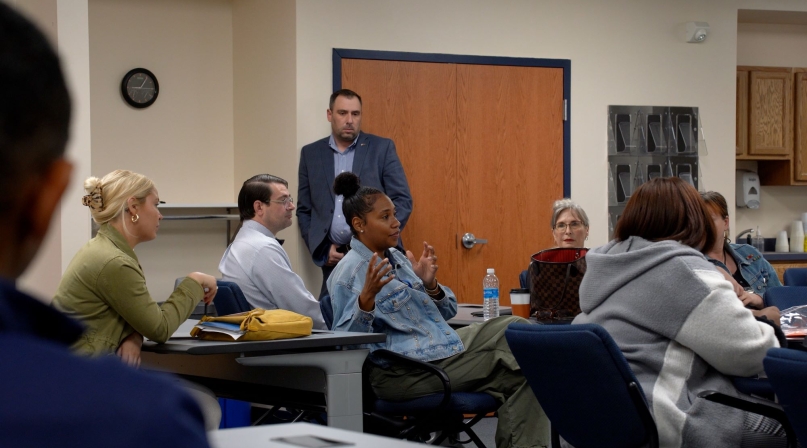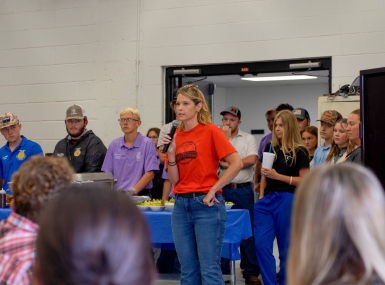Facing changing landscape, Venango County, Pa. empowers next generation for economic success

Key Takeaways
Once a manufacturing powerhouse, Venango County, Pa. faces a changing economic landscape, setting up both challenges and opportunities.
Rural counties across the country have been contending with a decreasing population, especially young, skilled residents to build out a shifting workforce. In 2023, 2,171 counties, or 69% of counties, experienced a natural decrease in population, meaning deaths outnumbered births. (This was down from 2022, when 2,337 counties (74.3%) experienced a natural decrease.)
Despite these shifts, new optimism emerges from the Venango County’s youth and young professionals, whose energy and innovation are seen as critical drivers of the community’s revitalization.
County officials participating in the NACo Rural Leaders for Economic Mobility (RLEM) program recently visited Venango County on a three-day peer exchange to address key economic mobility challenges facing rural communities. Economic mobility is the ability of a person or family to improve their economic status over time.
Venango County Commissioner Albert “Chip” Abramovic and Program Officer Sarah Pistella of the McElhattan Foundation aimed to showcase how they are fostering partnerships with local nonprofits, small businesses and school districts to align the needs of their communities, and learn how best to be in service, while also learning from other county officials how they are handling similar obligations.
Amid several programs administered by nonprofits and philanthropies, county commissioners have brokered the relationships among those organizations and helped identify the county’s greatest needs.
“Through this partnership we really want to ensure that people get ahead in Venango County, that people don’t have to leave in order to do so,” Pistella said.
For Venango County, this exchange was an opportunity to emphasize their commitment to tackling economic challenges by investing in its people and creating pathways out of poverty, a step toward a more equitable and prosperous future for all residents.
To adapt to changing times, local officials aim to diversify its economy beyond its manufacturing roots, with new opportunities arising in tourism and technology. Developing and retaining a skilled workforce to support these industries is essential, and the county is betting on its younger generation to lead the way.
A number of youth-focused programs are already shaping the future workforce. The Innovation Institute for Tomorrow introduces students to advanced technologies, including robotics and drones, igniting interest in STEM (science, technology, engineering and mathematics) fields and preparing young people for high-tech jobs.
The United Way of Venango County’s Success by 6 program addresses early childhood education, focusing on both cognitive and social-emotional skills. This comprehensive approach ensures that children are ready to excel in kindergarten and beyond, laying a strong foundation for academic and personal success.
Beyond academics, Venango County is actively bridging the gap between education and career readiness. The United Way’s Career Camps offer students hands-on exposure to various industries, helping them discover potential career paths through immersive experiences with local businesses. For older students, the United Way’s career counselors work with schools to provide job shadowing, scholarship guidance and assistance with college applications, equipping them with resources to make informed choices about their futures.
Young professionals are also rising to the occasion, making their mark on Venango County’s future. The FLEX (future leaders and entrepreneurs exchange) Young Professionals group, supported by the Venango Area Chamber of Commerce, offers networking, professional development and leadership training. By connecting young professionals with experienced business leaders and civic activities, FLEX empowers them to play an active role in the county’s economic landscape. Programs like Rural Leaders for Economic Mobility reinforce this by equipping local leaders with strategies to improve economic mobility, further strengthening Venango’s community of forward-thinking leaders.
Still, Venango County faces real challenges. Jodi Lewis, executive director of the Franklin Area Chamber of Commerce in Pennsylvania said that revitalizing the county’s downtown areas — such as renovating upper-story spaces in commercial buildings — is vital to attracting businesses and residents. Demographic concerns, including population outmigration, underscore the need to create appealing opportunities for young people to remain in the county and invest in their community.
Venango County’s focus on youth engagement is about more than filling jobs — it’s about cultivating a dynamic, resilient community. Young people bring fresh perspectives, entrepreneurial spirit and a drive for positive change. By investing in their development, Venango County is investing in a brighter, more vibrant future.
This economic renewal effort is a collective endeavor. Partnerships between businesses, educational institutions, government agencies and community organizations are working to create a nurturing ecosystem for young people to thrive.
Programs like United Way’s Connect2Contribute program introduce middle school students to the importance of volunteerism, instilling civic responsibility and providing skills for meaningful community involvement.
By embracing the talents and leadership of its young people, Venango County is not only addressing the challenges of today but is also laying the groundwork for a prosperous future.
Featured Initiative
Rural Leaders for Economic Mobility
Rural Leaders for Economic Mobility is a knowledge-sharing peer learning network that will empower local government leaders and partners from 10 low-population counties.

Related News

Inland port offers opportunity for Hertford County, N.C.
Hertford County, N.C. doesn’t have a lighthouse, but that hasn’t stopped its economic future from shining thanks to what became known as Project Green Lantern.

Chamber of commerce program helps keep workers on the job
Audrain County, Mo.'s Workforce Resource Assistance Program has helped employers keep staff in place, reducing turnover and promoting stability.

County leadership guides shared prosperity
There’s no chicken-or-egg debate: Economic mobility is not just a byproduct of growth — it is the result of intentional county governance.
